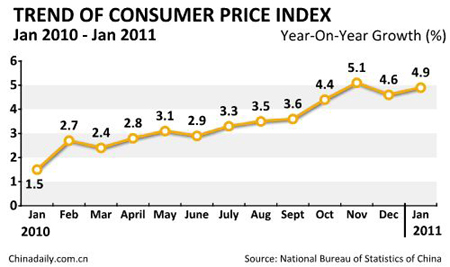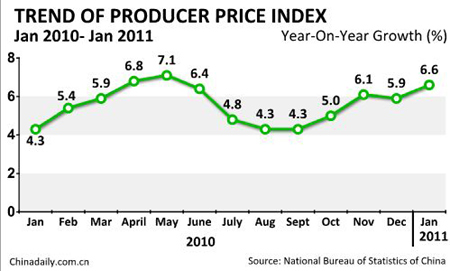Statistics
China's Jan CPI up 4.9%; PPI up 6.6%
Updated: 2011-02-15 10:38
(Xinhua)
|
 |
BEIJING - China's consumer inflation rose in January on surging food prices, but increased less than market expectations.
The consumer price index (CPI), the main gauge of inflation, rose 4.9 percent in January year on year, the National Bureau of Statistics (NBS) announced Tuesday.
The figure is 0.3 percentage points higher than that of December, and is 0.2 percentage points lower than the 28-month high in November.
Although the figure is lower than market expectations of above 5 percent, inflation remains a daunting problem complicated by ongoing winter drought in the country's north, migrant worker wage increases and global commodity price hikes.
"The extremely cold weather and the Spring Festival holiday spending pushed prices up 1 percent from a month ago," NBS said in a question and answer statement on its website.
The producer price index (PPI), the main gauge of inflation at the wholesale level, rose 6.6 percent in January year on year.
|
 |
Food prices, which in the past accounted for a third of the basket of goods in China's CPI calculation, surged 10.3 percent year on year.
The price of grain rose 15.1 percent year on year, and that of eggs was up 20.2 percent. Fresh vegetables advanced 2 percent, while fruit was up 34.8 percent.
The NBS also announced Tuesday it had reduced the weighting of food prices on the CPI by 2.21 percentage points and had increased that of living costs by 4.22 percentage points after the nation's home prices skyrocketed.
The statistics agency said the adjustment added 0.024 percentage points to January's figure, denying media reports of a drag-down of 0.3 percentage points.
The NBS said it regularly adjusts the composition of the CPI basket. Although China has moved to mop up excess liquidity and curb inflation over the past six months, the market expects new yuan loans in January to exceed 1 trillion yuan as banks typically rush to lend more at the start of the year.
Drought plaguing north China's wheat-growing areas also added to inflation concerns as reduced wheat output would likely affect prices.
Despite an array of factors pushing inflation up, the government should be able to keep prices under control, said Ba Shusong, a researcher with the Development Research Center of the State Council.
He said prices are usually high during the Spring Festival holiday. But after that, government measures will take hold and prices will stabilize.
Lu Ting, an economist with the Bank of America-Merrill Lynch, expected a moderate decline in CPI in February. The next rate hike will be after March, and the next bank reserve requirement ratio hike will take place after February, he said.
E-paper

Ear We Go
China and the world set to embrace the merciful, peaceful year of rabbit
Preview of the coming issue
Carrefour finds the going tough in China
Maid to Order
Specials

Mysteries written in blood
Historical records and Caucasian features of locals suggest link with Roman Empire.

Winning Charm
Coastal Yantai banks on little things that matter to grow

New rules to hit property market
The State Council launched a new round of measures to rein in property prices.
